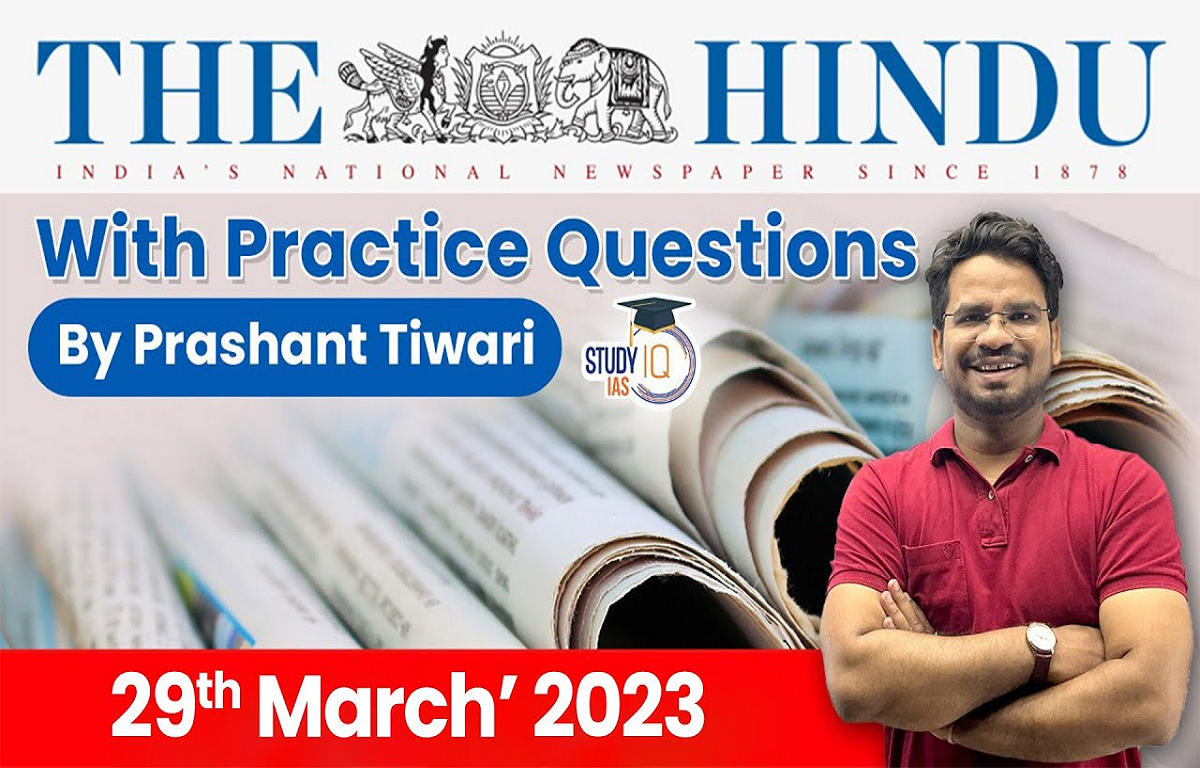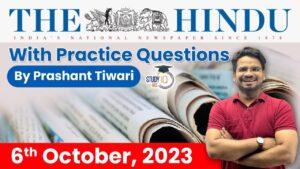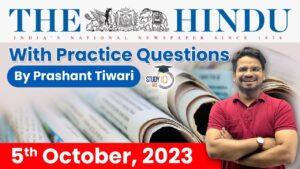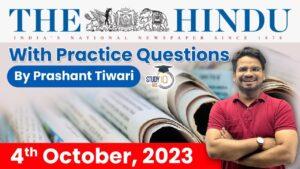The Hindu Newspaper Analysis for UPSC

The Hindu Newspaper Analysis 28 March 2023
Is there any national language?
- The Constitution of India has not given any language a national status.
What is the status of Hindi?
- Under Article 343 of the Constitution, the official language of the Union shall be Hindi in Devanagari script. The international form of Indian numerals will be used for official purposes.
- In the constituent assembly discussions, it was decided that English would continue to be used for a period of 15 years.
- The Constitution said that after 15 years, Parliament may by law decide on the use of English and the use of the Devanagari form of numbers for specified purposes.
- Article 351:
- It is the Union government’s duty to promote the spread of Hindi so that it becomes “a medium of expression for all elements of the composite culture of India” and also to assimilate elements of forms and expressions from Hindustani and languages listed in the Eighth Schedule.
Why was there opposition to the imposition of Hindi?
- The Official Languages Act, 1963 was passed in anticipation of the expiry of the 15-year period during which the Constitution originally allowed the use of English for official purposes.
- Its operative section provided for the continuing use of English, notwithstanding the expiry of the 15-year period.

Shanghai Cooperation Organization (SCO):
- SCO is a permanent intergovernmental international organization.
- It’s a Eurasian political, economic and military organization aiming to maintain peace, security and stability in the region.
- It was created in 2001. The SCO Charter was signed in 2002, and entered into force in 2003.
Genesis:
- Prior to the creation of SCO in 2001, Kazakhstan, China, Kyrgyzstan, Russia and Tajikistan were members of the Shanghai Five.
- Shanghai Five (1996) emerged from a series of border demarcation and demilitarization talks which the four former Soviet republics held with China to ensure stability along the borders.
- Following the accession of Uzbekistan to the organization in 2001, the Shanghai Five was renamed the SCO.
- India and Pakistan became members in 2017.

- Following a massive nationwide crackdown on spurious and sub-standard medicines, the licences of 18 pharma companies have been cancelled and some firms have been directed to stop manufacturing on the account of poor-quality medicines.
- Earlier this month, the Centre inspected 76 pharma companies and 26 of them were served a show-cause notice. The majority of the companies were operating in Himachal Pradesh, Madhya Pradesh and Uttarakhand.
- A Health Ministry source said that there has been a cancellation of product permission of three companies. This was phase-1 of the campaign wherein 203 pharma companies were identified and action was taken on 76 companies.
What are the Related Regulations in India?
- The Drugs and Cosmetics Act:
- The Drugs and Cosmetics Act, 1940 and Rules 1945 have entrusted various responsibilities to central and state regulators for regulation of drugs and cosmetics.
- It is mandatory for the manufacturers to adhere to the prescribed requirements for licensing of manufacturing units & medicines including proof of safety & effectiveness, compliance with the Good Manufacturing Practices (GMP).
Central Drugs Standard Control Organisation(CDSCO):
- Prescribes standards and measures for ensuring the safety, efficacy and quality of drugs, cosmetics, diagnostics and devices in the country.
- Regulates the market authorization of new drugs and clinical trials standards.
- Supervises drug imports and approves licences to manufacture the above-mentioned products.
- CDSCO regulates export of drugs in India, any manufacturer with the certification from CDSCO can export drugs outside India.
Drugs Controller General of India:
- DCGI is the head of department of the CDSCO of the Government of India responsible for approval of licences of specified categories of drugs such as blood and blood products, IV fluids, vaccines and sera in India.
- DCGI also sets standards for manufacturing, sales, import, and distribution of drugs in India.

- About: Diabetes is a Non-Communicable Disease (NCD) that occurs either when the pancreas does not produce enough insulin (a hormone that regulates blood sugar, or glucose), or when the body cannot effectively use the insulin, it produces.
Types of Diabetes:
- Type 1 Diabetes:
- It is also known as juvenile diabetes (as it mostly affects children of age 14-16 years), this type occurs when the body fails to produce sufficient insulin.
- It is predominantly diagnosed in children and adolescents. Although the prevalence is less, it is much more severe than type 2.
Type 2 Diabetes:
- It affects the way the body uses insulin. While the body still makes insulin.
- Type 2 diabetes can occur at any age, even during childhood. However, this type of diabetes occurs most often in middle-aged and older people.
- Gestational Diabetes: This type occurs in women during pregnancy when the body sometimes becomes less sensitive to insulin. Gestational diabetes does not occur in all women and usually resolves after giving birth.
- Impacts of Diabetes: It affects the five major organs namely, Kidney, Heart, Blood vessels, Nervous System, and Eyes (retina).
- Factors Responsible: Factors that lead to increase in diabetes are an unhealthy diet, lack of physical activity, harmful use of alcohol, overweight/obesity, tobacco use, etc.
About NCPCR:
- Set up in March 2007 under the Commission for Protection of Child Rights Act, 2005.
- It works under the administrative control of the Ministry of Women & Child Development.
- Definition: The Child is defined as a person in the 0 to 18 years age group.
- The Commission’s Mandate is to ensure that all Laws, Policies, Programmes, and Administrative Mechanisms are in consonance with the Child Rights perspective as enshrined in the Constitution of India and also the UN Convention on the Rights of the Child.
- Under the RTE Act, 2009, the NCPCR can:
- inquire into complaints about violation of the law.
- summon an individual and demand evidence.
- seek a magisterial enquiry.
- file a writ petition in the High Court or Supreme Court.
- approach the government concerned for prosecution of the offender.
- recommend interim relief to those affected.
Composition:
- This commission has a chairperson and six members of which at least two should be women.
- All of them are appointed by Central Government for three years.
- The maximum age to serve in commission is 65 years for Chairman and 60 years for members.

- India has become the first country in the world to estimate the tuberculosis (TB) burden in-country and launch its own mathematical system to estimate the disease burden.
- It has opted to step away from the global estimates drawn up each year by the World Health Organization (WHO). The Health Ministry noted that as per this data, the global TB reduction numbers stand at 11% while the reduction in TB cases in India is 18%. “This model was constructed based on the natural history of diseases, individual status of infection, disease, healthcare seeking, missed or correct diagnosis, treatment coverage and outcomes including cure and death,” said a senior Health Ministry official.
- The Ministry added that India’s TB incidence rate stands at 196 per 1,00,000 population, instead of the 210 estimated by the WHO.
- Pradhan Mantri TB Mukt Bharat Abhiyan?
- It’s an initiative of Ministery of Health and Family Welfare (MOHFW) to accelerate the country’s progress towards TB elimination by 2025.
Objectives:
- Provide additional patient support to improve treatment outcomes of TB patients
- Augment community involvement in meeting India’s commitment to end TB by 2025.
- Leverage Corporate Social Responsibility (CSR) activities.
Components:
- Ni-kshay Mitra Initiative: It is to ensure additional diagnostic, nutritional, and vocational support to those on TB treatment.
- Ni-kshay Mitra (Donor) are those who can support by adopting health facilities (for individual donor), blocks/urban wards/districts/states for accelerating response against TB to complement government efforts.
- Ni-kshay Digital Portal: It will provide a platform for community support for persons with TB.

- The word “lawfare” is a portmanteau of “law” and “warfare”. It refers to the weaponisation of law, and of legal systems, in order to intimidate, harm, or delegitimise an opponent (often, a political opponent).
- To prevent people from being dragged to the courts in frivolous proceedings, the law of defamation is clear that if references are made to an indefinite “class” of people, an individual cannot claim that they are a member of that class, and have, therefore, been defamed. For example, if I say that “all lawyers are thieves”, a lawyer cannot come to court and say that they have been defamed, unless they can show a specific imputation identifying them, directly.
- While the fact of conviction is one thing, the quantum of the sentence is another. Criminal defamation has a maximum penalty of two years’ imprisonment.
- The Representation of the People Act, the relevant law, stipulates that if a person is convicted of any offence and sentenced for a period of not less than two years, he shall stand disqualified from the legislature for the period of his sentence, and for a further period of six years after his release.


 The Hindu Newspaper Analysis 6 October 2...
The Hindu Newspaper Analysis 6 October 2...
 The Hindu Newspaper Analysis 5 October 2...
The Hindu Newspaper Analysis 5 October 2...
 The Hindu Newspaper Analysis 4 October 2...
The Hindu Newspaper Analysis 4 October 2...

















